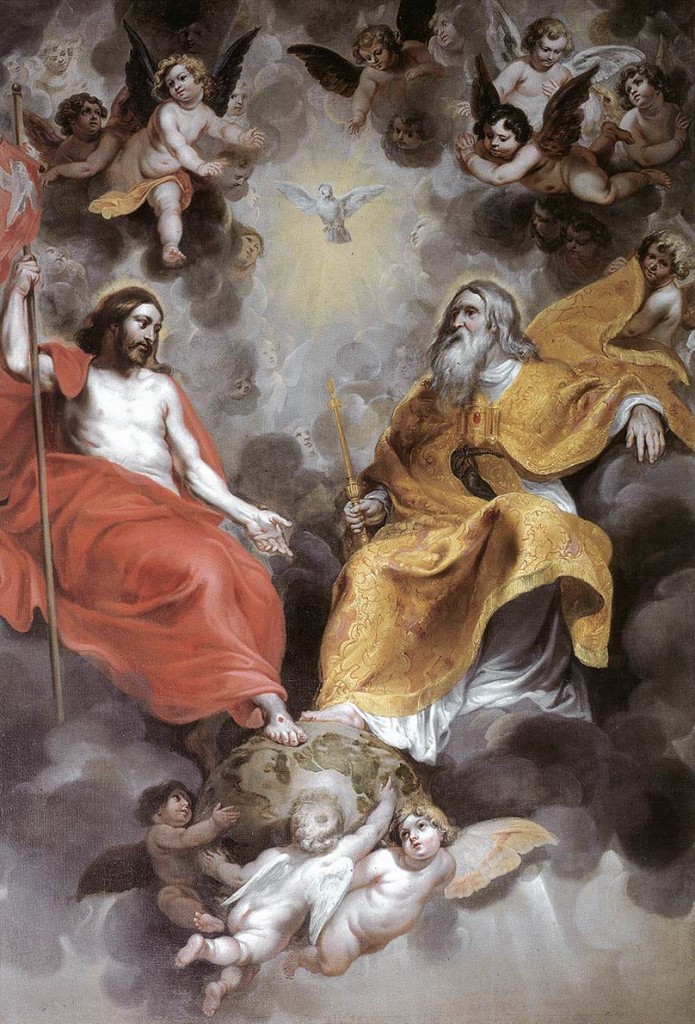Note: If you wish to receive, via e-mail, (1) my weekly newsletter or (2) daily copies of these posts, notify me at rrbates1951@gmail.com and indicate which you would like. I promise not to share your e-mail address with anyone. To unsubscribe, send me a follow-up email.
Trinity Sunday
If you’ve ever been confused by the Holy Trinity, welcome to the club. There are those who see Christianity as a polytheistic religion because it appears to have multiple gods, and there are those who have been deemed heretics (the Arians) because, reasoning the matter out, have concluded that Jesus is not co-eternal with God. After all, if he has been begotten from “the Father,” then he must be subordinate to him.
To such minds, I would imagine, the Nicene Creed dances around the issue with its “begotten, not made, of one Being with the Father.” And the same would go for the Holy Spirit, who we are told “proceeds from the Father and the Son. With the Father and the Son he is worshiped and glorified.” If two of the three gods come second or third, how can there not be subordination?
To be sure, there are those who dismiss the use of reason altogether in articulating the nature of the Trinity. Thomas Browne in the 17th century, drawing on the 3rd century Christian writer Tertulian, said, “I believe because it is absurd” and that, if anything, Christianity is too logical. “Methinks there be not impossibilities enough in Religion for an active faith,” he writes in The Religion of a Physician (1643). But this strikes me as the kind of self-complacent thing one can say only if everyone around one is a Christian.
I, who need some rational explanation, understand the Trinity as an expression of our evolving understanding of God, whom we first saw as a being outside ourselves, then potentially existing within an extraordinary individual, and finally as potentially within all of us. But I should emphasize, as I engage in this discussion, that I am no theologian. Far deeper minds that mine have grappled with the nature of the Trinity.
I also understand that Reason has limits. While I don’t leave my reasoning mind at the door as I enter a church—that way lies superstition—neither do I think that one can understand God through Reason alone. Recently I have started wondering whether there is more of a poetic truth than a literal truth to the Trinity—which is to say, a truth that provides glimpses of something more profound than expository prose can provide. In other words, perhaps we should look first to poets and artists rather than to logicians for understanding.
I started thinking this way about the Trinity after reading a lyric by the remarkable Malcolm Guite, an Anglican priest and poet who writes sonnets for all the church’s festivals. In “Trinity Sunday,” which we Anglicans celebrate today, he revels in the apparent contradictions.
For Guite, there’s a beginning but it’s “not in time or space.” God is “three in one and one in three, in rhyme,/In music, in the whole creation story.” God gave us the gift of imagination and so we “sing the chord that calls us to the dance,/ Three notes resounding from a single tone.” We have poetry and music to “sing the End in whom we all began,” a line that may echo T.S. Eliot’s “in my beginning is my end” (Four Quartets). Our God is “beyond, beside us and within.”
Rationally, this may not seem logical. Poetically, however, it coheres and carries a kind of conviction.
Trinity Sunday
My Malcolm Guite
In the Beginning, not in time or space,
But in the quick before both space and time,
In Life, in Love, in co-inherent Grace,
In three in one and one in three, in rhyme,
In music, in the whole creation story,
In His own image, His imagination,
The Triune Poet makes us for His glory,
And makes us each the other’s inspiration.
He calls us out of darkness, chaos, chance,
To improvise a music of our own,
To sing the chord that calls us to the dance,
Three notes resounding from a single tone,
To sing the End in whom we all begin;
Our God beyond, beside us and within.


